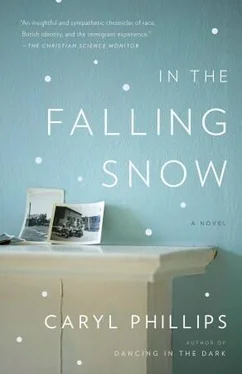He watches as his boss gently shoulders his way to the bar. On the positive side, a few weeks’ leave means that he won’t have to write the stupid policy report on trans-racial adoption. He assumes that Lesley Thornton will be put in charge of his department, which makes perfect sense given the fact that before her last promotion she used to run Women’s Affairs, and so she at least has some knowledge of his newly expanded responsibilities. Race Equality initiatives will, presumably, be put on hold. Maybe Clive is trying to ease him out, or perhaps he is seeking to increase Lesley’s portfolio? However, the more he thinks about Clive’s motives the more he realises that he simply doesn’t care. Time away from the whole Race Equality, Disability and Women’s Affairs circus is what he needs, and if temporary humiliation is the price he has to pay to escape the clutches of the local authority for a few weeks, then he is ready to pay. A grinning Clive Wilson walks triumphantly towards him clutching two more large glasses of wine, one white and one red. He decides that he will drink his wine quickly and leave Clive Wilson alone in the bar where, as the evening wears on, his boss will no doubt run into old friends or simply make new ones.
FOR THE FIRST time since his student days, he is living without a daily structure. Clive Wilson’s suggestion that he take a research break has enabled him to ignore the alarm clock. During his first year at university his erratic sleeping habits inconvenienced nobody for he had no girlfriend and, aside from his lectures and the odd tutorial, his main focus was football training, and that did not start until four in the afternoon. During his second and third years his involvement with Annabelle meant that he had less time for football but, much to his girlfriend’s frustration, he remained unpredictable with regard to the time when he went to, or emerged from, his bed. Thanks to Clive Wilson he has been able to resume the indulgent sleeping patterns of his youth, but after just one unstructured week he realises that he is simply wasting his time. He has filled a yellow legal pad with notes for his proposed book about music, but most of the so-called notes are copied from earlier ideas that he had initially scribbled on Post-its before transferring the nuggets of wisdom into the back of old diaries. The one thing that he has achieved in the past week is to create an office space in the corner of his living room where he has arranged everything in an orderly fashion. The books on the two shelves are neatly divided into fiction and non-fiction, the A4 writing pads are neatly stacked, the Post-its and brightly coloured paper files are easy to reach, and the newly purchased laptop computer and printer-scanner-fax, while not the absolute top of the range, suggest a man who is serious about his home office. He stares at the screen and resists the urge to listen again to David Ruffin’s recordings as a solo artist and then compare Ruffin’s voice to when the singer was lead vocalist of the Temptations. He has replayed ‘I Wish It Would Rain’ three times already, but his written thoughts amount to two sentences. ‘Once he liberated himself from the Temptations there was a new tonal flexibility to his voice. One can sense both pain and elation co-existing in a raw and vulnerable fashion, whereas loyalty to the group had previously reduced his voice to harmonic decoration.’ Would he really learn anything new by listening to this song for a fourth time?
He checks his email. Ruth wants to know if he will be attending a disability workshop in Milton Keynes next month because, if so, she will have to book a hotel room for she’s heard that the non-smoking doubles are going fast. There are two emails from Annabelle, who is clearly still annoyed that he hasn’t made time to meet her and have the ‘urgent’ talk about Laurie’s behaviour, but in the meantime she wants to know if he is coming to parents’ evening. Her second message, somewhat sarcastically, reminds him of the date of parents’ evening. He clicks out of his email account without answering and pulls up the chapter headings and wonders if he should reconfigure the structure of the book. Maybe this will get him started. During the course of the past week the book has shrunk in scope as he abandoned the chapter to do with gospel music, and then the one about the blues, having finally admitted that he knows precious little about either genre. With regard to jazz, he agonised and wondered if it was even possible to write a book about contemporary music without including something about this tradition, but he finally convinced himself that there were already hundreds of respectable volumes on the subject and, quite frankly, he didn’t need the hassle of adding his opinions into the mix for even the most level-headed people tended to become either very defensive, or unusually aggressive, when explaining their convictions about jazz.
He is now contemplating a three-part study of the music of the sixties, the seventies and the eighties. The first part of the book, ‘Motown and the Suburbs’, will specifically concern itself with soul music, the middle section, ‘Rebel Music,’ will address itself to the rise of reggae as a global phenomenon, and the final third of the book ‘Whose World?’ will look at the implications, musically and culturally, of the emergence of so-called ‘World Music’. This new structure seems more manageable to him, but he still has the problem of not being entirely sure of how one actually starts to write a book. He wonders if this is what people mean when they talk about having writer’s block, but he quickly reminds himself that, up until this extended research break, he has had little chance to seriously address himself to the project, having had to be content to snatch writing time at weekends, or on bank holidays. Annabelle often consoled her husband by telling him that his responsibilities at work meant that he obviously did not have enough free time to do anything other than simply plan a book, and he should not be so hard on himself. In her less supportive moments, his exasperated wife would point out that if he really wanted to write then he should stop bleating and just get on and do it, but within the hour she would be apologising and literally, and metaphorically, stroking his back and encouraging him to keep trying. For his part, he remains undecided whether or not the issue really is time, or if he fundamentally lacks motivation. Conjuring with the idea of writer’s block is a new option, and while he remains tempted by the ease with which he might claim to be afflicted with this malady, the more rational part of him is fully aware that in order to be stricken with this condition he would first have to be able to provide tangible evidence that he has gone beyond the planning stage and actually written something.
The local library is undeniably dingy. People toting heavy shopping bags often step inside its vaulted entry hall simply to shelter from the rain, and stubborn local vagrants have to be regularly ushered out and back on to the street. In the centre of the reading room are two large wooden tables surrounded by orange plastic chairs, which are generally vacant. Should anybody inadvertently leave a book on top of one of the tables then the eager librarian will swoop and swiftly return the volume to its rightful place on a shelf. It is over a year since he first scanned the popular music ‘collection’ and discovered that, apart from a paperback biography of Nat King Cole, and a semi-academic book which claimed to be an investigation of the influence of religion on the musical development of Sam Cooke, Wilson Pickett and Curtis Mayfield, there is no material in this library that is going to be of any use to him. Nevertheless, he has temporarily abandoned the neat desk at his Wilton Road flat in the hope that a change of atmosphere will stimulate him to begin writing. This is the second afternoon that he has sat in a plastic chair at the far end of the larger of the two tables with his back to the window. From this vantage point he need only raise his head slightly to see who is coming through the door. However, in two days he has barely set down a word that he has not immediately scratched out with his cheap blue biro, having deemed the writing to be either derivative or so trite that, were he to be brutally honest, his advice to himself would be to give up.
Читать дальше









![Unknown - [Carly Phillips] The Bachelor (The Chandler Brothe(Bookos.org) (1)](/books/174132/unknown-carly-phillips-the-bachelor-the-chandle-thumb.webp)


